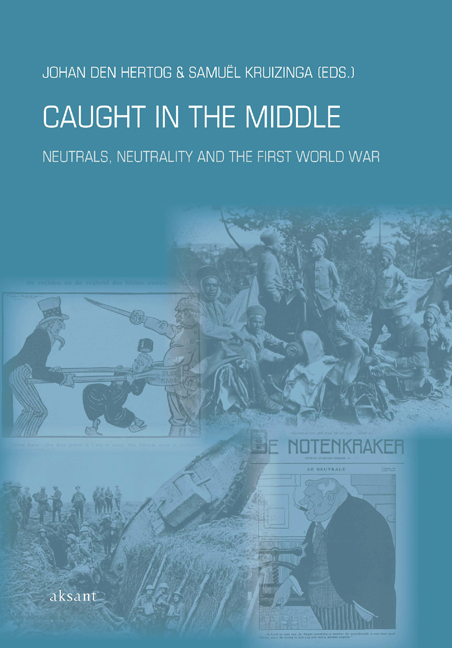Book contents
- Frontmatter
- Contents
- Acknowledgements
- Chapter 1 Introduction
- Chapter 2 Dutch Neutrality and the Value of Legal Argumentation
- Chapter 3 ‘Upon the Neutral Rests the Trusteeship of International Law’: Legal advisers and American unneutrality
- Chapter 4 Spanish Neutrality During the First World War
- Chapter 5 Britain’s Global War and Argentine Neutrality
- Chapter 6 NOT Neutrality: The Dutch government, the Netherlands Oversea Trust Company, and the Entente blockade of Germany, 1914-1918
- Chapter 7 From Parasite to Angel: Narratives of neutrality in the Swedish popular press during the First World War
- Chapter 8 Colour-blind or Clear-sighted Neutrality?: Georg Brandes and the First World War
- Chapter 9 The Hottest Places in Hell?: Finnish and Nordic neutrality from the perspective of French foreign policy, 1900-1940
- Chapter 10 The Other End of Neutrality: The First World War, the League of Nations, and Danish neutrality
- About the Contributors
Chapter 8 - Colour-blind or Clear-sighted Neutrality?: Georg Brandes and the First World War
Published online by Cambridge University Press: 28 January 2021
- Frontmatter
- Contents
- Acknowledgements
- Chapter 1 Introduction
- Chapter 2 Dutch Neutrality and the Value of Legal Argumentation
- Chapter 3 ‘Upon the Neutral Rests the Trusteeship of International Law’: Legal advisers and American unneutrality
- Chapter 4 Spanish Neutrality During the First World War
- Chapter 5 Britain’s Global War and Argentine Neutrality
- Chapter 6 NOT Neutrality: The Dutch government, the Netherlands Oversea Trust Company, and the Entente blockade of Germany, 1914-1918
- Chapter 7 From Parasite to Angel: Narratives of neutrality in the Swedish popular press during the First World War
- Chapter 8 Colour-blind or Clear-sighted Neutrality?: Georg Brandes and the First World War
- Chapter 9 The Hottest Places in Hell?: Finnish and Nordic neutrality from the perspective of French foreign policy, 1900-1940
- Chapter 10 The Other End of Neutrality: The First World War, the League of Nations, and Danish neutrality
- About the Contributors
Summary
During the First World War the great Danish critic and scholar Georg Brandes (1842-1927) took part in a host of debates, at home in Denmark as well as abroad, about the war and neutrality. From his unshakable neutral, anti-war point of view, he criticised the belligerents for conducting the war on false premises, pretending to fight for ideals like civilisation and culture, when what was at stake was really commercial and imperialistic interests. This neutral anti-war position was not an easy one to hold. When he criticised one of the belligerent parties, he was immediately blamed for supporting the other; when he kept quiet, even his silence was interpreted as a tacit acceptance of one or the other party's policy. His position in neutral Denmark was also rather isolated as most other intellectuals here took a definite stand and publicly chose sides.
If Brandes today is hardly known outside Denmark or maybe Scandinavia in a wider public, he was undoubtedly the most internationally noted Dane at the time. His opinions were respected and his name figured regularly in the columns of the international press. He had visited the United States on a successful lecture tour just a couple of months before the war broke out, travelling there as an invited guest on the German ocean liner ss Vaterland's maiden voyage – accompanied part of the way by the only other contemporary Danish international star possibly eclipsing him: the actress Asta Nielsen.
The American Brandes scholar Doris R. Asmundsson gives an explanation as to why ‘he for too long [has] been unjustly neglected in the English-speaking world’ in the preface to her monograph Georg Brandes: Aristocratic Radical (1981): ‘Only the vagaries of public taste can account for the decline in reputation of a man who was world-famous, even infamous, as recently as the late nineteenth and early twentieth century.’ Asmundsson's title points towards the one thing he might still be remembered for: making Nietzsche known to the world. But aside from the essays translated into English as Friedrich Nietzsche (1914), he is the author of major critical works like Hovedstrømninger i det 19de Aarhundredes Literatur3 (1871- 87) and substantial biographies and studies of e.g. Søren Kierkegaard (1877) and William Shakespeare (1895-96).
- Type
- Chapter
- Information
- Caught in the MiddleNeutrals, Neutrality and the First World War, pp. 121 - 138Publisher: Amsterdam University PressPrint publication year: 2012



